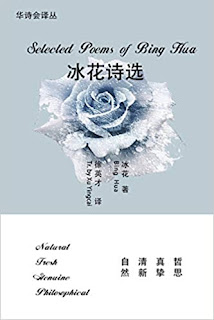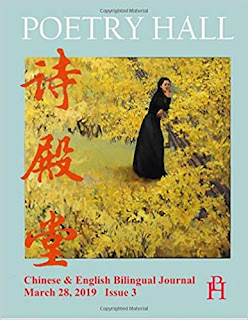Cultural Reflection on “Bing Hua Phenomenon”
序:“冰花现象” 的文化思考
文/林楠
在蓊蔚纷繁的新诗丛林处,有一个“玫瑰诗苑”。透过网上[冰花文轩]窗口,可窥见她是如何恣意地绽放魅力,其精致、幽深,绝对的非比寻常! 她就是“情诗皇后”冰花。冰花避开时尚目光和政治视角,紧紧抓住神圣的自然属性,浓墨重彩地书写自然之美、生命之美和人与人之间,人与自然之间的谐和、深情与挚爱。
讴歌生命之爱和情感之美,是冰花诗的核心意向。作家以非常出色的诗句,营造出一个又一个充满活力的美妙境界,把女性特有的温柔、温暖和爱的情怀,用她自己特有的情绪方式、语言方式和节奏方式,酣暢通透地传达到读者的心灵深处。诗人在花园里,溪水边,乃至在自己整个生命的原野上,精心培育着馥郁的玫瑰花香,也培育着美好。
赤子般的热情和真诚,令诗人在创作中自觉地、难能可贵地实践着国学大师王国维对纳兰性德的称颂:“以自然之眼观物,以自然之舌言情” 。她把整个身心,全部溶入大自然的气息之中,仿佛自己就是一簇晶莹的冰花,直接与自然对话,直接溶入浩瀚苍穹的有序与无序。这是一种充满文化意蕴的、非常独特的生命体验和精神感悟。
“以自然之眼观物,以自然之舌言情” , 促成诗人在创作过程中,总是以主体情感与客观物象相溶合,善于给景象赋予灵性,这是冰花创作实践的重要美学特征,这一点,构成她颇具个性特质的创作风格。
从她的一些脍炙人口的短诗中,可以得到印证,如《双面扇》,《不是轻浮 不是漂》等。精妙的句子和意象,都属于对自然景物的细心观察、联想。
一个诗人的诗能够赢得读者如此广泛的喜爱,这是近年发生的一种罕见现象。从这个意义上讲,我们评论冰花的创作,就不能仅仅只谈作品,还要注意到这个无法绕开的现象。我们暂且把这个“现象”称为“冰花现象”。
德国哲学家海德格尔说“作品存在就是建立一个世界……”,只是冰花建立的这个“世界”有些特别,其引导读者展开无止境的情感想象,无疑是最大特色。我们还可将其的效果概括为“一快三多一奇”:一快,传播快;三多,读者多,参与多,评论多;一奇,颠狂出奇。
冰花的诗受欢迎的程度,让人想起一句蒙古族谚语:“大雁起飞时,掀动了湖里的水花;姑娘出嫁时,带着村子里的风水。” 风笛诗社为冰花入社,发喜讯,致欢迎辞,迊新热潮一浪高过一浪。风笛诗社还在加州一家报纸上为她刋出一整版“欢迎冰花入社”的专辑。这些年,冰花收到读者的墨宝、赠画等数十件。读者以如此形式“参与”,无疑是对诗人的真情感谢。是读者受到精神滋养后,对诗人的回馈。
冰花写少女情怀的诗青涩、天真,很容易让人沉静在李清照《点绛唇》的氤氲之中。 冰花写成熟女子的诗婉约, 感人。如《荷的心事》等。诗都是发表在网上,可偏有些读者认为这是写给他的。还顽强地认定诗人是少女。于是,梦游在冰花诗的意境中,陷入了春的怀想,还买好了礼物要来看望她的。更有位网友魔症缠身般地写了上百封求爱信。这则诗坛佳话,可谓是天下奇闻!
“冰花现象” 的形成,既有社会因素,又有艺术本身的作用。显然,研究这样一位诗人,我们需要在一个特定的社会视野下,來审视她的创作状态及其文化涵意。在物欲横流的当下,人们更渴望回归自然,寻回爱的本源。恰逢这样一个时机,冰花的诗敲击着人们的心扉,以 “润物细无声” 的方式,潜入人的内心深处的。
痖弦先生说,“写诗像恋爱” 。 “每一位诗人都是一位伟大的爱人 ” 。这么看來,“冰花现象”也就见“奇”不“奇”了。无可争辯的事实是,在社会转型期,冰花担当了一个特殊的文化角色。
多年来,诗坛已少见冰花这种震颤灵魂的童贞般的纯洁与坦率。作者跨文化的诗歌创作,必将受到不同民族,不同语种读者的共同喜爱。冰花留下的足迹和她卓越的诗歌,为文学研究提供了一些非常值得思考的话题。
Cultural Reflection on “Bing Hua Phenomenon”
By Lin Nan
Translated by Xu Yingcai
In the lush woods of new poems thrives “a rose
garden.” We can see how its flowers bloom in the online blog entitled Bing
Hua Lounge. Its exquisiteness and depth are certainly extraordinary!
The blogger is Bing Hua, “the Queen of Love Poems.” Unswung by the trendy rush
or political preaching, firmly grasping the sacred essence of Mother Nature,
she accents her iridescent color on the beauty of nature and life and on the
harmony, affection, and true love among humans and between the humans and
nature.
Her poems center on lauding the love of
life and the beauty of affection. With remarkable poetic lines, she has created
one after another vital and wonderful artistic realms. Thus, in her own way of
sentiment, her own way of language, and her own way of rhythm, she has freely
and fully instilled the female’s tender, warm, and affectionate feelings into
the deep souls of her readers. She, by a creek, in a garden, or even in the field of her whole life, meticulously cultivates
aromatic roses.
In this, she also cultivates beauty.
With the enthusiasm and sincerity like a
baby, she consciously practices in her creative works what Wang Guowei complimented
Nalan Xingde, “To see the world through the eye of nature and to express the
feelings with the voice of nature.” As if she were a cluster of ice flowers, she
integrates her whole heart into nature so she could directly communicate with
nature and directly submerge herself in the orderly and unorderly boundless
firmament. This is indeed meritorious. This is a very unique and culture-rich
life experience and mental enlightenment.
Her practice of Wang Guowei’s compliment empowers her, in the creation of poetry,
to integrate subjective feelings with objective images and to enliven images with spirit. This is an important
aesthetic aspect of her creative practice and forms a unique individuality in
her creative style.
These
characteristics are well revealed in some of her appealing, praiseworthy short
poems such as The Hand Fan, Neither out of Flighty or Levity, etc.,
in which all the ingenious lines and wondrous images come from close observation of nature
and are the reflection of it as well.
It
is indeed a rare phenomenon in recent years that what a poet has produced has
won such broad popularity among her readers. Looking from this perspective,
when we talk about Bing Hua’s poems, we cannot just touch upon her works ----
We should also consider this unavoidable phenomenon. Let’s for the time being
refer this “phenomenon” as the “Bing Hua Phenomenon.”
German
philosopher Martin Heidegger once said in his Origin of the Work of Art,
“To be a work means to
set up a world…,“ yet the “world” Bing Hua has set up is somewhat special in
that it evokes endless imaginations in her readers. This is
undoubtedly the most important characteristic of her works, and its
effectiveness can be summarized in three words: “quickly, widely, and surprisingly.”
Here “quickly” refers to how quickly her works reach her readers; “widely”
refers to how widely her readers become, respond, and comment; and
“surprisingly“ refers to how surprisingly her readers cheer for her creation.
The popularity of Bing Hua’s poems
reminds me of a Mongolian proverb “When a wild goose takes off, it splashes the
water in the lake; when a girl marries, she carries the Feng Shui from the
village.“ This explains why Fengdi Poetry Club went so far as to spread the
glad news and give welcoming speeches when Bing Hua joined the club. The club pushed the welcoming wave so high that
it even went out of its way to have bought a full-page of a California
newspaper to run a special welcome news for her. Over the last few years, more
than a dozen readers have sent her paintings and calligraphic works to express
their sincere thanks for the spiritual nourishment they have drawn from her
poems.
In Bing Hua’s
poems, young maidens are pure and naïve, which infuses readers with the mood Li
Qingzhao’s “Dian Jian Chun” would reflect while matured maidens, graceful and
heartwarming, like those depicted in her The Lotus’ Obsession and other
poems. These poems are posted online, but some readers still think these poems
are written particularly for them. Some readers even think the poet must be a
young maiden herself. With this imagination, they sleepwalk in the artistic
realms she has created and sink into youthful longing. One of the readers even
prepared a gift and planned to visit her. As if spell-bound, another reader has
written over a hundred love letters to her. What a fascinating story in the
world of poetry.
The formation of “Bing Hua
Phenomenon” involves both social and artistic factors. Obviously, in studying
such a poet, we should examine both her creative state and the cultural meaning
of her works from a specific social perspective. In today’s world of
materialism, more and more people long to return to nature to find the origin
of love. This is the moment Bing Hua’s poems have reached their hearts. This is
exactly like what a Tang’s poetic line depicts “spring rain quietly nourishes
all beings.”
Mr. Ya Xuan once compared “poetry writing
to love affairs” and pointed out that “every poet is a great lover him- or
herself.” If we agree with him, then, the “abnormality” of “Bing Hua
Phenomenon” would look quite “normal.” It is unarguable that Bing Hua has
played a very special cultural role during this social transitional period.
Over
the years, in the field of poetry, such soul-touching baby’s pureness and
candor have been rarely seen. Her inter-cultural poetic creativity will almost
certainly be well received by readers of different nationalities, from
different ethnic backgrounds, and with different languages. Her remarkable
poems, along with the footprints she has left on the poetic road, have provided
thought-provoking topics for the study of literature.
《“冰花现象”的文化思考
》 提到的诗
双面扇
一面是春 一面是秋
你是那春 我是那秋
春与秋
一纸之隔
天涯之遥
春与秋
常有相同的温度
却永远不属于
相同的季节
A Hand Fan
One
side is spring, the other autumn
You
are that spring, me that autumn
Spring
and autumn
A
separation only a paper-thickness apart
Yet
feels as if in different world corners
Spring
and autumn
Often
not much difference in temperature
Yet
never belong
To
the same season
不是轻浮 不是漂
河水溢出堤岸
柳枝摇点水面
不是轻浮 不是漂
海水拥抱沙滩
浪花抚摸石礁
不是轻浮 不是漂
Neither out of Flighty or Levity
Rivers
overflow banks
This
is neither out of flighty or levity
Ocean
waves embrace beaches
Wave
splashes caress reefs
This
is neither out of flighty or levity
荷的心事
一朵含苞待放的夏荷
心 在心事中裹缠
谁能把裹缠片片剥开
谁能把荷的心呼唤出来
无缘的人啊
不是走得太急
就是来得太晚
甜蜜的心在等待中
化为了苦莲
结果无法改变
荷的心事
成了一孔孔的藕断丝连
The Lotus’ Obsession
A
summer lotus bud, yet to bloom
Has
an obsession wrapped in its heart
Who
can peel off those wrapping petals
Who
can call out the wrapped heart
People
not karma-bound to her
Have
either rushed by too quickly
Or
arrived too late
For
while waiting
Her
amorous heart has turned into bitter seeds
An
irreversible plight
The
lotus’ obsession
Remains,
though her root is pocketed with holes




Comments
Post a Comment